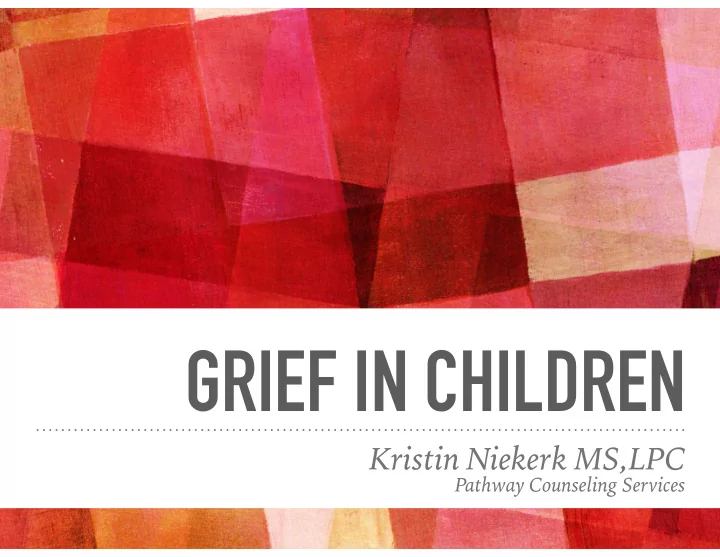

GRIEF IN CHILDREN Kristin Niekerk MS,LPC Pathway Counseling Services
PRESCHOOL ➤ Developmentally they don’t understand death. It’s to abstract. ➤ Leads to “Magical” thinking such as they caused the death or the individual will come alive again like in movies, stories or like Jesus. ➤ Can talk about it a lot trying to understand. ➤ Sometimes only experience is from a movie or a pet’s death.
COMMON REACTIONS ➤ Separation Anxiety including clinginess ➤ Behavioral issues trying to express their feelings they can’t verbalize ➤ Toileting issues or other physical complaints (stomach, headache) ➤ Talking about, looking for & dreaming about the individual. ➤ Regression- baby talk, gestures, etc.
HOW TO HELP ➤ Lots of re-assurance, appropriate physical touch ➤ Books about death (Christian book store or christianbooks.com) ➤ Comfort items, opportunities to play, routine is critical ➤ Share your sadness with them to normalize it ➤ Extra patience, calm tone, understanding
➤ Developmentally believe death is temporary. The individual will come back, still has feelings, lost, etc. ➤ “Magical” thinking lingering ➤ They ask a lot of very specific questions trying to understand what happened, death and often times questions about the individual’s body. Primary School Aged
➤ Confusion about God and Heaven ➤ Fearful death is contagious thus will their parents be ok or die too? ➤ Separation anxiety ➤ Emotion dysregulation ➤ Fear of talking about it or other extreme obsessing about it. ➤ Only point of reference could be movies or a pet’s death. ➤ Are very literal and obedient to please thus can become very confused. Common Reactions
➤ Again lots of comfort & reassurance they and family are safe. ➤ Show your own emotion appropriately. Be willing to talk about it. Use feeling language. Teaches their feelings are normal and reactions are ok. ➤ Be specific and concrete. Do not be abstract. Refer to death as death or died not passed, gone. ➤ Again books are helpful and art is helpful to express feeling they don’t have language for. How to Help
MIDDLE SCHOOL AGE ➤ Developmentally they understand death as permanent. ➤ Littles are watching closely but this age is now processing how others are reacting. ➤ Take cues on how they are “suppose” to react from above.
COMMON REACTIONS ➤ They can compare their grief reactions to others. ➤ Their concern for safety can be stronger. Fearful of death of a loved one stronger. ➤ Won’t let themselves express grief to protect others. ➤ Withdraw from others or over compensate by always talking about it, more needy. ➤ False sense of responsibility to protect loved ones from emotions, safety, etc.
HOW TO HELP ➤ Let them talk if they are willing to..however they can express it. Repeatedly if needed. ➤ Extra patience with processing. Don’t correct them unless the fact is wrong. ➤ Don’t attempt the make them feel better with language like “ At least”, “Be strong”, etc. Teaches emotions and thoughts are wrong. ➤ Share your thoughts, emotions appropriately to normalize. Shows you understand them.
DON’TS & DO’S ➤ Do use specific language like ➤ Don’t use abstract language like “died” or “dead”. “passed” or “gone”. ➤ Do talk, cry, share memories or ➤ Don’t hide your own emotions & stories together. It’s honoring to grief for fear of making it worse. their memory. ➤ Do be patient with each other ➤ Don’t expect everyone to grieve in and reassure each other grief the same way or at the same time. takes time & comes in waves. ➤ Don’t correct language or minimize ➤ Do encourage expression and emotions. “Be strong” or make emotions. Accept where each “should” statements. It teaches person is at. Remember each feelings are wrong & creates developmental levels. expectations. ➤ Do only give the facts you know ➤ Don’t make up facts to answer are confirmed and admit when questions or feel included. you don’t know. ➤ Don’t try to make their pain/ ➤ Do validate you understand & sadness go away. be willing to sit with it.
➤ Has your child been to a funeral before? ➤ Mrs. D and family will be in front with the casket open or closed. ➤ Don’t have to “say the right thing”. Simply give her a hug & tell her you are sorry & love her. No “ At least”s. ➤ There will be many tears even from the teachers and adults your child knows & it is ok because they are sad too. ➤ There will be stories told about him & their family. ➤ The family will probably walk in together and walk out behind his casket from the church. FUNERAL PREPARATION
SALEM SUPPORT AVAILABLE ➤ Counseling will be available at the school for any child, parent, or teacher who needs it after Ryon’s death & also the day after the funeral (the next school day). ➤ Comfort Dogs on campus presentation references: ➤ https://www.kidshealth.org.nz/bereavement-reactions-age-group https://www.psychologytoday.com/us/blog/two-takes-depression/201612/the-dos-and-donts-talking-child-about-death
BOOKS TO HELP TALK ABOUT DEATH, GRIEF & HEAVEN Focus on the family: Resource List- children grief (list of books, CDs, webpages, etc
Recommend
More recommend